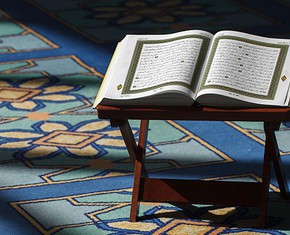The views expressed in our content reflect individual perspectives and do not represent the authoritative views of the Baha'i Faith.
Throughout all of recorded human history, law and religion have intertwined.
Many scholars believe that most secular law has its origins in the teachings of religion. When the Prophets and Founders of the world’s great faiths appeared, they each brought a code of moral conduct and taught it to their followers, and many of those laws and the spiritual foundations they came from found their way into the rule of law and the legal systems of governments.
And while many religious systems have suffered since their inceptions from the corruption of the original laws their Founders brought, Baha’is believe that God renews religion regularly—and also abrogates, replaces and changes its former laws:
…the change and modification of conditions, and the altered requirements of different centuries and times, are the cause of the abrogation of laws. For a time comes when these laws are no longer suitably adapted to conditions. Consider how very different are the requirements of the first centuries, of the Middle Ages, and of modern times. Is it possible that the laws of the first centuries could be enforced at present? It is evident that it would be impossible and impracticable. In the same manner, after the lapse of a few centuries, the requirements of the present time will not be the same as those of the future, and certainly there will be change and alteration. In Europe the laws are unceasingly altered and modified; in bygone years, how many laws existed in the organizations and systems of Europe, which are now abrogated! These changes and alterations are due to the variation and mutation of thought, conditions and customs. If it were not so, the prosperity of the world of humanity would be wrecked.
For example, there is in the Pentateuch a law that if anyone break the Sabbath, he shall be put to death. Moreover, there are ten sentences of death in the Pentateuch. Would it be possible to keep these laws in our time? It is clear that it would be absolutely impossible. Consequently, there are changes and modifications in the laws, and these are a sufficient proof of the supreme wisdom of God. – Abdu’l-Baha, Some Answered Questions, pp. 94-95.
This revitalized, renewed religion, the Baha’i teachings say, is the greatest defense against crime:
…religion is a mighty bulwark. If the edifice of religion shakes and totters, commotion and chaos will ensue and the order of things will be utterly upset, for in the world of mankind there are two safeguards that protect man from wrongdoing. One is the law which punishes the criminal; but the law prevents only the manifest crime and not the concealed sin; whereas the ideal safeguard, namely, the religion of God, prevents both the manifest and the concealed crime, trains man, educates morals, compels the adoption of virtues and is the all-inclusive power which guarantees the felicity of the world of mankind. But by religion is meant that which is ascertained by investigation and not that which is based on mere imitation, the foundation of divine religions and not human imitations. – Abdu’l-Baha, Foundations of World Unity, p. 30.
As Abdu’l-Baha writes above, Baha’is believe that two things safeguard us all: law and faith. Laws punish criminals and act as deterrents to others who might consider committing crimes. But true religion goes much deeper than civilization’s laws possibly can, with its moral guidance and its emphasis on the acquisition of human virtues like love, kindness, peace, selflessness and concern and respect for others. True religion speaks to the inner reality and the conscience and the soul of every person, and true religion has an enormous influence on people’s behavior.
The Baha’i teachings foresee a future global civilization with an eventual goal of no criminal behavior at all, when society and individuals stop taking vengeance on others, where jails and prisons become increasingly unnecessary and spiritual education allows us all to live in a crime-free culture:
Divine civilization, however, so traineth every member of society that no one, with the exception of a negligible few, will undertake to commit a crime. There is thus a great difference between the prevention of crime through measures that are violent and retaliatory, and so training the people, and enlightening them, and spiritualizing them, that without any fear of punishment or vengeance to come, they will shun all criminal acts. They will, indeed, look upon the very commission of a crime as a great disgrace and in itself the harshest of punishments. They will become enamoured of human perfections, and will consecrate their lives to whatever will bring light to the world and will further those qualities which are acceptable at the Holy Threshold of God.
There are two sorts of retributory punishments. One is vengeance, the other, chastisement. Man has not the right to take vengeance, but the community has the right to punish the criminal; and this punishment is intended to warn and to prevent so that no other person will dare to commit a like crime. This punishment is for the protection of man’s rights, but it is not vengeance; vengeance appeases the anger of the heart by opposing one evil to another. This is not allowable, for man has not the right to take vengeance. But if criminals were entirely forgiven, the order of the world would be upset. So punishment is one of the essential necessities for the safety of communities, but he who is oppressed by a transgressor has not the right to take vengeance. On the contrary, he should forgive and pardon, for this is worthy of the world of man. – Abdu’l-Baha, Some Answered Questions, pp. 268-269.
You’re probably wondering, if you’ve read this series of essays from the beginning, what happened to that frightened young girl the legal system exacted its vengeance on, or maybe you wondered what happened to the other three burglars who all got away. So did I. A few months after it all happened I couldn’t stifle my curiosity any longer, and I tracked down the investigating detective. He had forgotten the case—understandable given his workload, probably—but told me he’d look into it.
He called a few days later. No word on any of the other three burglars, he told me, but he did find out a little more information about what happened to the girl. She had gone to jail to serve her sentence, but her worsening illness and more injuries from another brutal jail beating had gotten her transferred to the hospital ward for treatment. There, with minimal security, she escaped one night, wearing only a hospital gown.
“So she’s in the wind,” the detective told me. “But we’ll catch her.”
I hope not.

















Comments
Sign in or create an account
Continue with Googleor